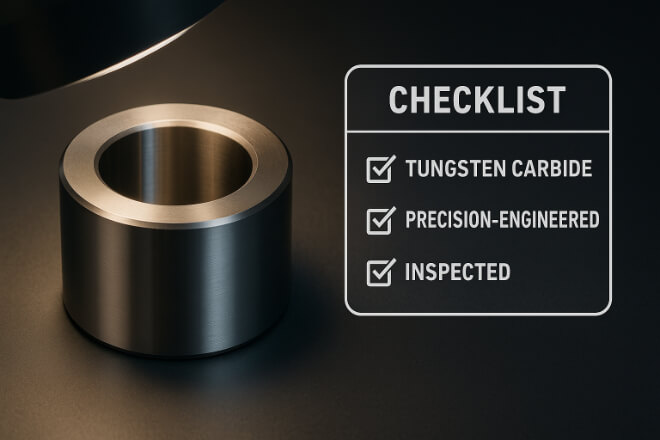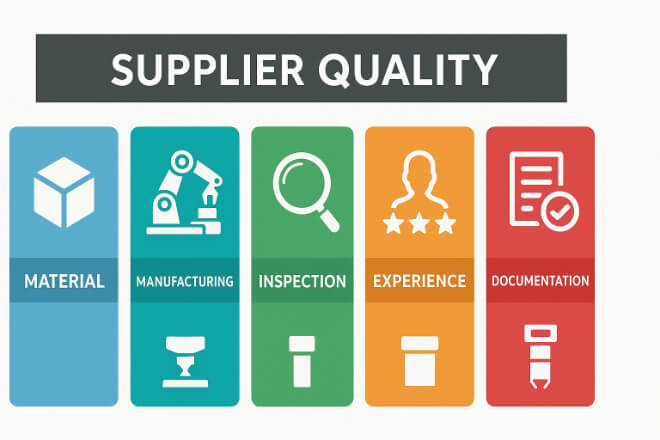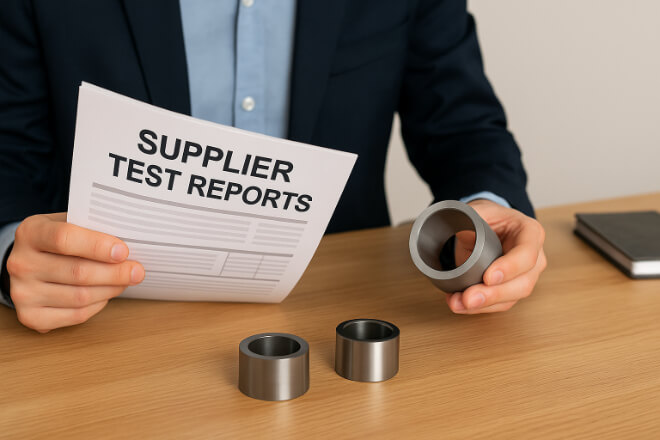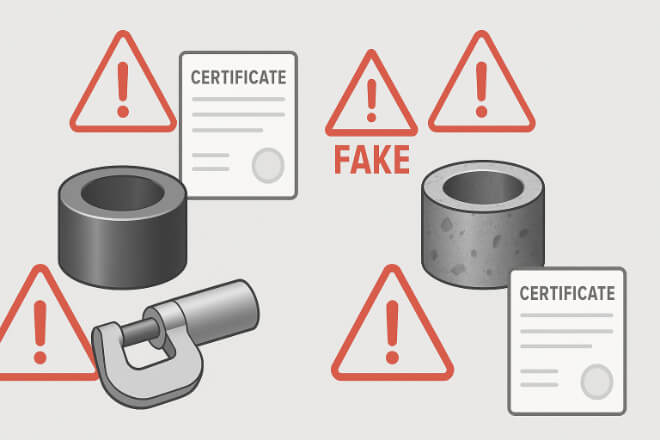When sourcing bujes de carburo de tungsteno, quality is not just about the product — it’s about the supplier behind it.
A good supplier can ensure consistent performance, fast delivery, and long-term reliability. A poor supplier, on the other hand, can lead to production delays, early wear, or even equipment damage.
For decision-makers in petróleo y gas, marine, power, and industrial machinery sectors, choosing a high-quality carbide bushing supplier is a critical step toward reducing downtime and maintaining system performance.
This article explains how to evaluate supplier quality, what factors matter most, and how to verify that your vendor can deliver carbide bushings that truly meet your technical and operational needs.
Why Supplier Quality Matters

Tungsten carbide bushings work under extreme pressure, friction, and temperature.
Even small material variations or improper sintering can cause cracking, corrosion, or premature failure.
A reliable supplier ensures:
Consistent material composition (verified by testing)
Tight tolerances and surface finish
Traceable production batches
Accurate certification and documentation
Without strict quality control, the risk of failure increases — which can cost thousands in replacement parts and downtime.
Key Areas to Evaluate in a Supplier

The best way to judge a supplier is through evidence, not promises.
Below are the five most important areas to review before choosing your tungsten carbide bushing partner.
1). Material Quality and Certification
The foundation of a reliable carbide bushing lies in its raw materials.
A good supplier provides certified tungsten carbide powder and detailed material certificates with each batch.
You should ask for:
EN 10204 3.1 or 3.2 certificates
Chemical composition reports (e.g., WC + binder %)
Binder type information (Cobalt or Nickel)
This ensures you’re getting genuine carbide, not a mixed or recycled version.
2). Manufacturing Capabilities
A supplier’s equipment and process control directly affect the final product’s performance.
Look for a manufacturer that:
Controls the entire production line (from powder pressing to sintering to grinding)
Has CNC and centerless grinding machines for precision work
Offers lapping and polishing for Ra ≤ 0.05 µm finishes
Conducts in-process inspection at every stage
You can often confirm this by requesting factory photos, visiting the plant, or asking for process documentation.
3). Quality Control and Inspection Procedures
High-end carbide bushings require tight dimensional and surface control.
A professional supplier performs multiple tests before shipment:
| Inspection Stage | Test Type | Objetivo | Equipment Used |
|---|---|---|---|
| Raw Material | Chemical Composition Test | Confirm WC purity and binder ratio | Spectrometer, XRF |
| Green Compact | Density and Dimensional Check | Ensure correct pressing force and mold fit | Calipers, balance |
| After Sintering | Hardness, Porosity, Shrinkage | Validate mechanical properties | Rockwell Tester, Microscope |
| Final Product | Surface Finish, Flatness, Concentricity | Confirm dimensional accuracy | Profilometer, Dial Indicator |
Suppliers that perform 100% inspection before shipping typically deliver the most consistent results.
4). Experience in Specific Applications
Not every supplier understands your industry’s challenges.
Por ejemplo:
Petróleo y gas bushings need high compressive strength and corrosion resistance.
Marine bushings must handle saltwater and high vibration.
Chemical pump bushings require Nickel-binder grades for acid resistance.
A supplier experienced in your field can recommend the best grade and geometry instead of just selling a standard part.
Always ask for case studies or references from similar industries.
5). Documentation and Traceability
A high-quality supplier provides full documentation for every order, including:
Material certificates
Dimensional inspection reports
Heat treatment and hardness results
Batch and lot numbers
EN 10204 3.1 compliance
This traceability helps engineers track material history and ensures audit readiness for ISO or API standards.
How to Verify Supplier Claims

Even with a professional-looking website, not all suppliers live up to their claims.
Here are practical ways to verify a supplier’s credibility before committing.
1). Request Sample Orders
Ask for sample bushings to check tolerance, surface finish, and dureza consistency.
Compare test results with their documentation — this will show if the supplier’s process is stable.
2). Review Certificates and Reports
Ensure that the documents are officially signed and stamped, not generic templates.
If possible, request third-party testing for high-value projects.
3). Conduct a Factory Audit
When feasible, visit the factory or arrange a remote video audit. Check for:
Real sintering furnaces and CNC machines
Clean production and inspection areas
Proper labeling and packaging
4). Evaluate Communication and Technical Support
A reliable supplier answers technical questions clearly and promptly.
Their ability to explain grades, tolerances, and applications reflects their real expertise.
Red Flags to Watch Out For

Even if prices are attractive, some warning signs should make you cautious:
No material certification provided
Inconsistent hardness or color across samples
Delayed responses to technical inquiries
No permanent address or company registration
Certificates without test standards (like ISO or ASTM)
If a supplier cannot explain how they measure or control quality, that’s a clear sign to look elsewhere.
Building Long-Term Quality Partnerships

The best supplier relationships are built on transparency and trust. Once you find a reliable tungsten carbide partner, consider:
Signing long-term contracts with fixed grade specifications
Requesting annual quality audits
Developing custom packaging and labeling standards
Using vendor scorecards to track performance (lead time, defect rate, communication)
Over time, a consistent supplier can help reduce total cost and improve your operational stability.
Conclusión
Evaluating supplier quality for tungsten carbide bushings is not just a sourcing step — it’s a strategic investment in reliability, safety, and performance.
By checking certifications, manufacturing capabilities, inspection systems, and application experience, you can separate truly qualified suppliers from the rest.
A strong supplier relationship means fewer failures, better lead times, and consistent performance — all of which directly support your company’s bottom line.
Si desea conocer más detalles sobre alguna empresa, no dude en contactarnos. Contáctanos.
